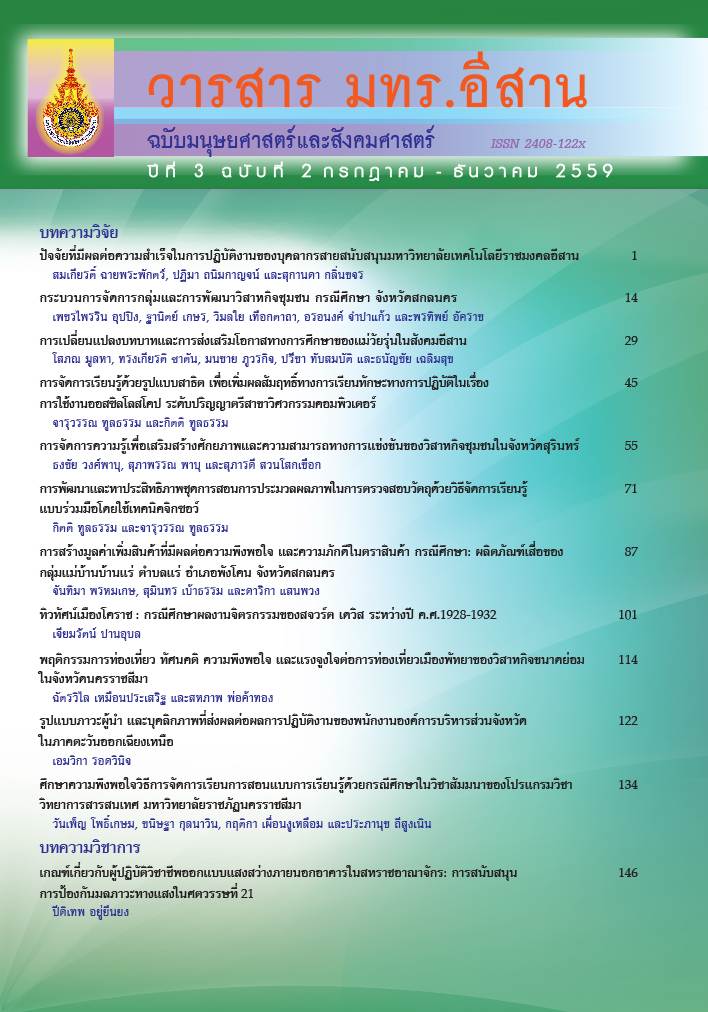Leadership and Personality Affecting the Performance of the Provincial Administration, North Eastern Region
Main Article Content
Abstract
The purpose of this research was to study the leadership and personality affecting the performance of the provincial administration, north eastern region. The factors considered are leadership, personality and performance. The sample used in this research was collected from the provincial administration, north eastern region. It consisted of 230 participants. The questionnaires were used as a tool to collect the data. The statistical tools used for data analysis were descriptive statistics, frequency, percentage, mean and standard deviation. Pearson correlation coefficients, and multiple regression analysis. The result showed that leadership and personality influence performance of the provincial administration, north eastern region. There was a positive relationship at 0.1 level of significance. The predictive power presented was 61.60 percent (= 0.61)
Article Details
บทความที่ได้รับการตีพิมพ์เป็นลิขสิทธิ์ของมหาวิทยาลัยเทคโนโลยีราชมงคลอีสาน
ข้อความที่ปรากฏในบทความแต่ละเรื่องในวารสารวิชาการเล่มนี้เป็นความคิดเห็นส่วนตัวของผู้เขียนแต่ละท่านไม่เกี่ยวข้องกับมหาวิทยาลัยเทคโนโลยีราชมงคลอีสานและคณาจารย์ท่านอื่นๆในมหาวิทยาลัยฯ แต่อย่างใด ความรับผิดชอบองค์ประกอบทั้งหมดของบทความแต่ละเรื่องเป็นของผู้เขียนแต่ละท่าน หากมีความผิดพลาดใดๆ ผู้เขียนแต่ละท่านจะรับผิดชอบบทความของตนเองแต่ผู้เดียว
References
Bass, B.M. (1994). Stogdill's Hand Booh of Leadership: A Survey of Theory and Research. New York: The Free Press
Bass, B.M. and Avolio. BJ. (1997). Improving Organizational Effectiveness Thorugh Transformational Leadership. Thosand Oaks, CA: Sage.
Costa, P.T. and MeCrae, R.R. (1995). Primary Traits of Eysenck's P-E-N System: Three and Five- Factor Solutions. Journal of Personality and Social Psychology. Vol. 42.
pp. 50-55
Gellatly, I.R. and P.G. Irving. (2001). Personality, Autonomy, and Contextual Performance of Managers. Human Performance. Vol. 14. No. 3. pp. 231-245
Granholm, A.R. (1988). Human Resource Director's Portfolio of Personnel Forms, Records, and Reports. New Jersey: Prentice-Hall, Inc.
House, Robert, J. (1997). The Social Scientific Study of Leadership: Quo Vadis. Journal of Management. Vol. 22. pp. 81-97
กนกวรรณ กอบกุลธนชัย. (2546). ศึกษาความสัมพันธ์ระหว่างเชาว์อารมณ์ ภาวะผู้นำกับผลการปฏิบัติงานของหัวหน้างาน ในโรงงานอุตสาหกรรมอิเล็กทรอนิกส์. ปริญญาวิทยาศาสตร์ หาบัณฑิต. (จิตวิทยาอุตสาหกรรม). กรุงเทพมหานคร: บัณฑิตวิทยาลัย มหาวิทยาลัยเกษตรศาสตร์
กัลยา วานิชย์วานิช. (2550). วิธีการใช้ SPSS for Windows ในการวิเคราะห์ข้อมูล. กรุงเทพมหานคร: สำนักพิมพ์ธรรมสาร
กอบศักดิ์ มูลมัย. (2554). ความสัมพันธ์ระหว่างภาวะผู้นำการเปลี่ยนแปลงของผู้บริหารโรงเรียนกับประสิทธิภาพการสอนของครูสังกัดสำนักงานเขตพื้นที่การศึกษาประถมศึกษาปทุมธานี เขต 1.ปริญญาศึกษาศาสตร์มหาบัณฑิต สาขาเทคโนโลยีการบริหารการศึกษา. มหาวิทยาลัยเทคโนโลยีราชมงคลธัญบุรี.
ธนวรรธ ตั้งสินทรัพย์ศิริ. (2550). พฤติกรรมองค์การ. กรุงเทพมหานคร: ธนรัชการพิมพ์
ณัชนัน แก้วชัยเจริญกิจ. (2550). บทบาทของครูผู้สอนในการจัดกิจกรรมและวิธีการปฏิบัติตามแนวทางของ Active Learning. เข้าถึงเมื่อ (9 ธันวาคม 2558). เข้าถึงได้จาก (http://www.itie.org)
บุญใจ ศรีสถิตย์นรากูร. (2550). ระเบียบวิธีวิจัย:แนวทางปฏิบัติสู่ความสำเร็จ. กรุงเทพฯ: ยูแอนด์ไอ อินเตอร์ มีเดีย
ปวริศา เนียรภาค. (2551). ภาวะผู้นำ บุคลิกภาพ การเห็นคุณค่าแห่งตน ความสามารถในการตัดสินใจกับผลการปฏิบัติงานของหัวหน้าพนักงานต้อนรับบนเครื่องบิน บริษัท การบินไทย (มหาชน) จำกัด. ปริญญาวิทยาศาสตร์มหาบัณฑิต. (จิตวิทยาอุตสาหกรรมและองค์การ). กรุงเทพมหานคร: บัณฑิตวิทยาลัย มหาวิทยาลัยเกษตรศาสตร์
ระบบข้อมูลกลาง องค์กรปกครองส่วนท้องถิ่น. (2558). กรมส่งเสริมองค์กรปกครองส่วนท้องถิ่น. เข้าถึงเมื่อ (9 ธันวาคม 2558). เข้าถึงได้จาก (www.dla.go.th)
สุรภา ขุนเพ็ง. (2547). ศึกษาความสัมพันธ์ระหว่างบุคลิกภาพกับผลการปฏิบัติงานของพนักงาน บริษัท ทีดี เค ประเทศไทย จำากัด. ปริญญาบริหารธุรกิจมหาบัณฑิต. (บริหารธุรกิจ การจัดการทั่วไป). กรุงเทพมหานคร: บัณฑิตวิทยาลัย มหาวิทยาลัยราชภัฏวไลยอลงกรณ์ ในพระบรมราชูปถัมภ์


